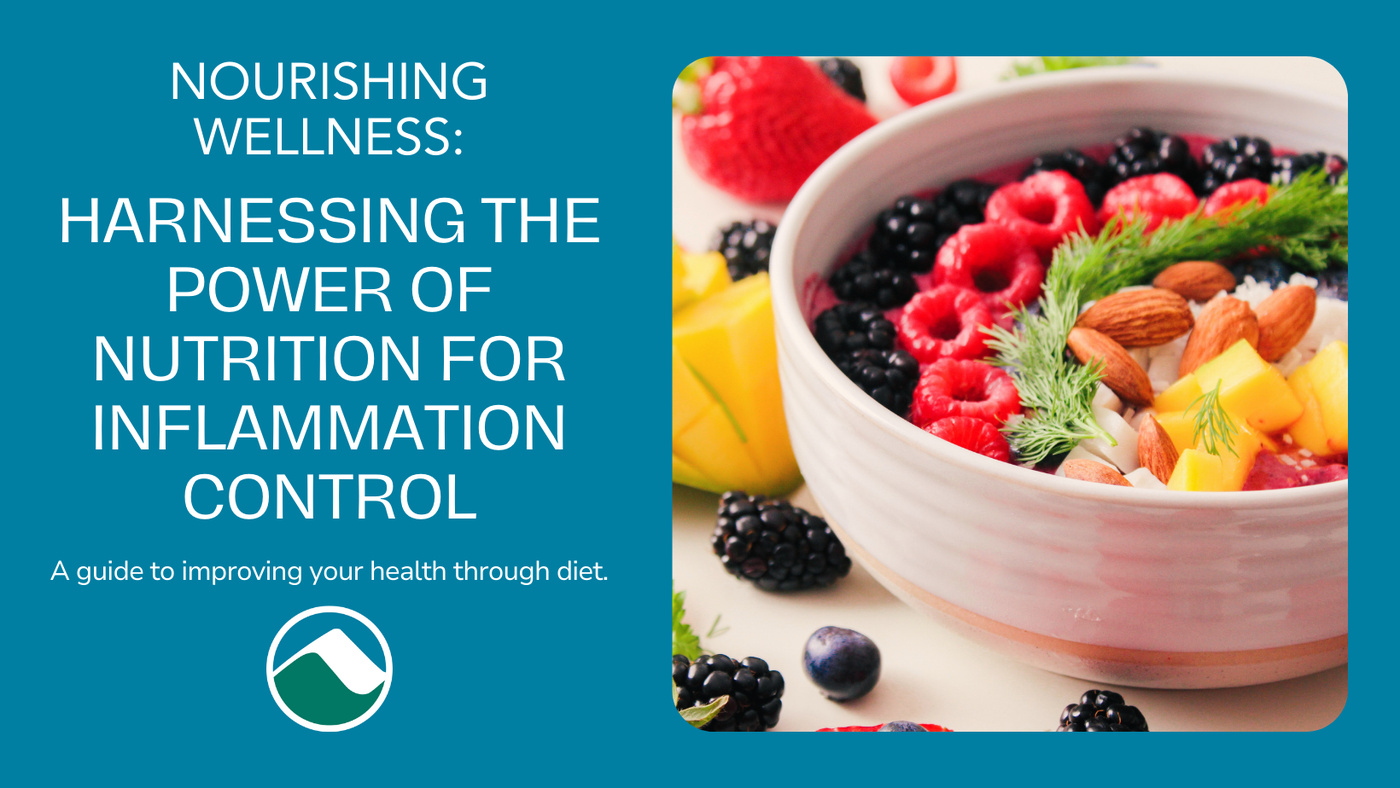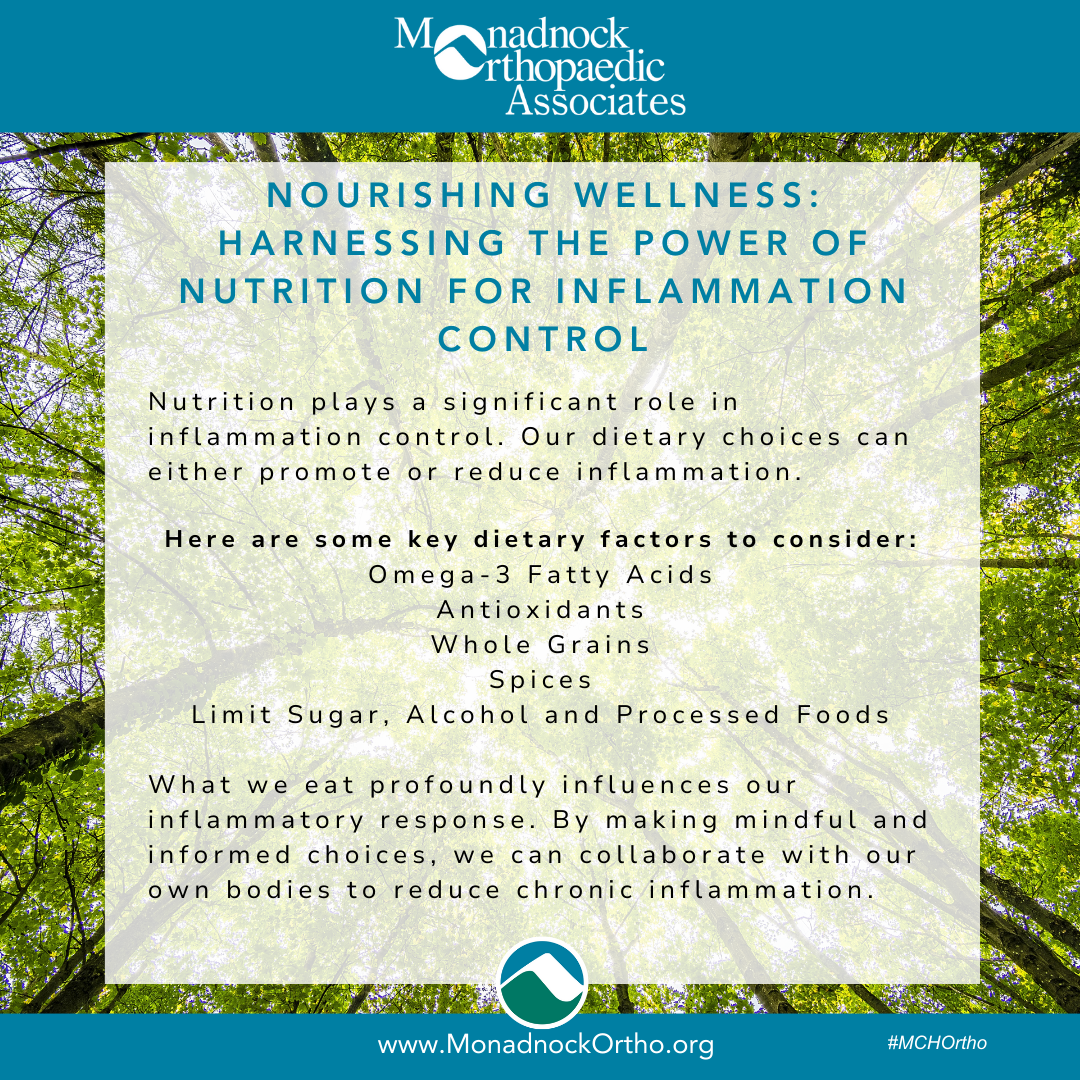Harnessing the Power of Nutrition for Inflammation Control


Let’s delve into a subject that I’m passionate about as a musculoskeletal system specialist: The powerful impact of nutrition on inflammation control. Whether you’re dealing with orthopedic issues, chronic pain or simply seeking a healthier, more vibrant life, understanding how our dietary choices affect inflammation is essential. This post will explore nutrition’s crucial role in managing inflammation.
Understanding Inflammation:
Inflammation is the body’s natural response to injury or infection. It’s a complex biological process that involves the immune system, serving to protect and heal us. However, when inflammation becomes chronic and systemic, it can contribute to a range of health issues, including orthopedic conditions like arthritis and chronic pain.
The Role of Nutrition:
Nutrition plays a significant role in inflammation control. Our dietary choices can either promote or reduce inflammation. Here are some key dietary factors to consider:
Omega-3 Fatty Acids: Foods rich in omega-3 fatty acids, such as fatty fish (salmon, mackerel, and sardines), flaxseeds, and walnuts, have anti-inflammatory properties. They can help dampen the flames of chronic inflammation.
Antioxidants: Fruits and vegetables are packed with antioxidants like vitamin C and E, which combat inflammation by neutralizing harmful free radicals. Berries, citrus fruits, and leafy greens are all excellent choices.
Whole Grains: Opt for whole grains over refined grains. Whole grains like quinoa, brown rice, and whole oats are high in fiber, which can help reduce inflammation.
Spices: Turmeric and ginger are known for their anti-inflammatory properties. Incorporating these spices into your diet can be a flavorful way to combat inflammation.
Limit Sugar, Alcohol and Processed Foods: Sugary and highly processed foods can trigger inflammation. Reducing your intake of these items can have a positive impact on inflammation control.
Collaborative Approach:
Maintaining an anti-inflammatory diet is not just about what you eat and what not to eat but also about how you eat. Collaborate with a registered dietitian like the staff here at MCH
to create a personalized nutrition plan tailored to your specific needs. This partnership can provide you with the guidance and support necessary to make sustainable changes. Additional information can be sought out by searching for “Anti-inflammatory Lifestyle” online.
Community and Wellness:
In Peterborough, New Hampshire, our community values health and well-being. Monadnock Community Hospital is committed to elevating the health of our community, and this extends to promoting nutritional awareness as a vital part of a healthier, more vibrant life.
The Bigger Picture:
Remember, the impact of nutrition on inflammation control is not just about preventing orthopedic issues. It’s about maintaining overall wellness, reducing the risk of chronic diseases like diabetes, autoimmune disease, obesity, arthritis and improving your quality of life.
In conclusion, what we eat profoundly influences our inflammatory response. By making mindful and informed choices, we can collaborate with our own bodies to reduce chronic inflammation. It’s a journey worth embarking upon.
Together, let’s foster a community of well-being, where good nutrition is a cornerstone of a healthier, happier life. Here’s to a future with less inflammation and more vitality!

Array
(
[section_title] =>
[section_text] =>
[posts_selection] => auto_taxonomy_terms
[section_posts] => Array
(
[0] => WP_Post Object
(
[ID] => 37333
[post_author] => 9192204
[post_date] => 2024-06-24 07:38:55
[post_date_gmt] => 2024-06-24 11:38:55
[post_content] =>
[post_title] => Guide to Preventing Youth Sports Injuries: Keeping Young Athletes Healthy
[post_excerpt] =>
[post_status] => publish
[comment_status] => closed
[ping_status] => closed
[post_password] =>
[post_name] => guide-to-preventing-youth-sports-injuries
[to_ping] =>
[pinged] =>
[post_modified] => 2024-07-17 18:07:39
[post_modified_gmt] => 2024-07-17 22:07:39
[post_content_filtered] =>
[post_parent] => 0
[guid] => https://monadnockcommunityhospital.com/?p=37333
[menu_order] => 0
[post_type] => post
[post_mime_type] =>
[comment_count] => 0
[filter] => raw
)
[1] => WP_Post Object
(
[ID] => 37337
[post_author] => 9192204
[post_date] => 2024-04-01 08:52:25
[post_date_gmt] => 2024-04-01 12:52:25
[post_content] =>
[post_title] => Provider Spotlight: Dr. Shawn P. Harrington from Reefs to Rehabilitation: Dr. Harrington's Unexpected Journey to Healing
[post_excerpt] =>
[post_status] => publish
[comment_status] => closed
[ping_status] => closed
[post_password] =>
[post_name] => dr-shawn-harrington-mch-orthopedic-surgeon
[to_ping] =>
[pinged] =>
[post_modified] => 2024-07-17 18:19:06
[post_modified_gmt] => 2024-07-17 22:19:06
[post_content_filtered] =>
[post_parent] => 0
[guid] => https://monadnockcommunityhospital.com/?p=37337
[menu_order] => 0
[post_type] => post
[post_mime_type] =>
[comment_count] => 0
[filter] => raw
)
[2] => WP_Post Object
(
[ID] => 36907
[post_author] => 9192204
[post_date] => 2024-02-19 07:47:15
[post_date_gmt] => 2024-02-19 12:47:15
[post_content] =>
[post_title] => Understanding Knee Arthritis
[post_excerpt] =>
[post_status] => publish
[comment_status] => closed
[ping_status] => closed
[post_password] =>
[post_name] => understanding-knee-arthritis-guide-to-orthopedic-treatment
[to_ping] =>
[pinged] =>
[post_modified] => 2024-07-18 14:42:18
[post_modified_gmt] => 2024-07-18 18:42:18
[post_content_filtered] =>
[post_parent] => 0
[guid] => https://monadnockcommunityhospital.com/?p=36907
[menu_order] => 0
[post_type] => post
[post_mime_type] =>
[comment_count] => 0
[filter] => raw
)
[3] => WP_Post Object
(
[ID] => 37284
[post_author] => 9192204
[post_date] => 2024-02-09 11:26:19
[post_date_gmt] => 2024-02-09 16:26:19
[post_content] =>
[post_title] => Managing Chronic Pain - Orthopedic Solutions and Lifestyle Changes
[post_excerpt] =>
[post_status] => publish
[comment_status] => closed
[ping_status] => closed
[post_password] =>
[post_name] => orthopedic-solutions-for-managing-chronic-pain
[to_ping] =>
[pinged] =>
[post_modified] => 2024-07-18 14:43:18
[post_modified_gmt] => 2024-07-18 18:43:18
[post_content_filtered] =>
[post_parent] => 0
[guid] => https://monadnockcommunityhospital.com/managing-chronic-pain-orthopedic-solutions-and-lifestyle-changes-copy/
[menu_order] => 0
[post_type] => post
[post_mime_type] =>
[comment_count] => 0
[filter] => raw
)
[4] => WP_Post Object
(
[ID] => 36758
[post_author] => 9192204
[post_date] => 2024-01-08 08:00:41
[post_date_gmt] => 2024-01-08 13:00:41
[post_content] =>
[post_title] => Maintaining Orthopedic Health in Your Golden Years
[post_excerpt] =>
[post_status] => publish
[comment_status] => closed
[ping_status] => closed
[post_password] =>
[post_name] => maintaining-orthopedic-health-in-your-golden-years
[to_ping] =>
[pinged] =>
[post_modified] => 2024-07-18 14:43:33
[post_modified_gmt] => 2024-07-18 18:43:33
[post_content_filtered] =>
[post_parent] => 0
[guid] => https://monadnockcommunityhospital.com/?p=36758
[menu_order] => 0
[post_type] => post
[post_mime_type] =>
[comment_count] => 0
[filter] => raw
)
[5] => WP_Post Object
(
[ID] => 36766
[post_author] => 9192204
[post_date] => 2024-01-01 08:00:56
[post_date_gmt] => 2024-01-01 13:00:56
[post_content] =>
[post_title] => 10 Tips for Preventing Orthopedic Injuries
[post_excerpt] =>
[post_status] => publish
[comment_status] => closed
[ping_status] => closed
[post_password] =>
[post_name] => tips-for-preventing-the-orthopedic-injuries
[to_ping] =>
[pinged] =>
[post_modified] => 2024-07-18 14:45:58
[post_modified_gmt] => 2024-07-18 18:45:58
[post_content_filtered] =>
[post_parent] => 0
[guid] => https://monadnockcommunityhospital.com/?p=36766
[menu_order] => 0
[post_type] => post
[post_mime_type] =>
[comment_count] => 0
[filter] => raw
)
[6] => WP_Post Object
(
[ID] => 36779
[post_author] => 9192204
[post_date] => 2023-12-11 07:30:04
[post_date_gmt] => 2023-12-11 12:30:04
[post_content] =>
[post_title] => How to Prevent Sports Injuries
[post_excerpt] =>
[post_status] => publish
[comment_status] => closed
[ping_status] => closed
[post_password] =>
[post_name] => tips-for-athletes-how-to-prevent-sports-injuries
[to_ping] =>
[pinged] =>
[post_modified] => 2024-07-18 14:45:00
[post_modified_gmt] => 2024-07-18 18:45:00
[post_content_filtered] =>
[post_parent] => 0
[guid] => https://monadnockcommunityhospital.com/?p=36779
[menu_order] => 0
[post_type] => post
[post_mime_type] =>
[comment_count] => 0
[filter] => raw
)
[7] => WP_Post Object
(
[ID] => 36732
[post_author] => 9192204
[post_date] => 2023-12-04 08:55:47
[post_date_gmt] => 2023-12-04 13:55:47
[post_content] =>
[post_title] => Harnessing the Power of Nutrition for Inflammation Control
[post_excerpt] =>
[post_status] => publish
[comment_status] => closed
[ping_status] => closed
[post_password] =>
[post_name] => harnessing-the-power-of-nutrition-for-inflammation-control
[to_ping] =>
[pinged] =>
[post_modified] => 2024-07-18 14:44:47
[post_modified_gmt] => 2024-07-18 18:44:47
[post_content_filtered] =>
[post_parent] => 0
[guid] => https://monadnockcommunityhospital.com/health-and-wellness-seminars-video-230817-copy-copy/
[menu_order] => 0
[post_type] => post
[post_mime_type] =>
[comment_count] => 0
[filter] => raw
)
[8] => WP_Post Object
(
[ID] => 37288
[post_author] => 9192204
[post_date] => 2023-10-13 12:01:31
[post_date_gmt] => 2023-10-13 16:01:31
[post_content] => Common Shoulder Problems and At-Home Solutions Seminar
October 12, 2023 at Monadnock Community Hospital
Presenter: Dr. Shawn P. Harrington, MD, FAAPMR
Part of the Health & Wellness Seminars at Monadnock Community Hospital (MCH)
Dr. Harrington has been this community’s Physiatrist and Musculoskeletal Specialist at Monadnock Orthopaedic Associates for the past two decades. He will review common shoulder pains we all experience, some options for self-care, and reasons to seek medical consultation. This workshop is directed toward anyone with interest in or personal experience with shoulder pain, whether from wear-and-tear, an old injury, athletics, or aging. Interactive discussion is welcome.
Dr. Harrington’s practice as a board-certified Musculoskeletal Physician is grounded in thorough diagnostic evaluation and treatment with 20 years of experience. He seeks to define a problem and then offers options and choices to guide patients toward a course of treatment all parties can agree on, leading to the best possible outcome. Recognizing that not every first choice leads to success, he establishes plans with patients that help bring about their goals.
Learn more about Dr Shawn P Harrington
Learn more about Monadnock Orthopaedic Associates
 At Monadnock Community Hospital, we are dedicated to enhancing the health and well-being of our community. This seminar is just one way we strive to elevate the health of our community by providing accessible, high-quality care.
At Monadnock Community Hospital, we are dedicated to enhancing the health and well-being of our community. This seminar is just one way we strive to elevate the health of our community by providing accessible, high-quality care.
 Learn more about the Health and Wellness Seminars at MCH
Watch more videos of our seminars
Background audio: Ten Minutes of Ambient Piano Relaxation by Music_For_Videosfrom Pixabay
[post_title] => Video: Common Shoulder Problems and At-Home Solutions Seminar with Dr. Shawn P. Harrington 2023
[post_excerpt] =>
[post_status] => publish
[comment_status] => closed
[ping_status] => closed
[post_password] =>
[post_name] => common-shoulder-problems-and-at-home-solutions
[to_ping] =>
[pinged] =>
[post_modified] => 2024-07-17 15:31:10
[post_modified_gmt] => 2024-07-17 19:31:10
[post_content_filtered] =>
[post_parent] => 0
[guid] => https://monadnockcommunityhospital.com/health-and-wellness-seminars-video-231012-copy/
[menu_order] => 0
[post_type] => post
[post_mime_type] =>
[comment_count] => 0
[filter] => raw
)
)
[posts_limit] => -1
[post_type] => post
[taxonomy] => tag
[terms] => harrington, physiatry
[section_id] => post-grid-3
)
Learn more about the Health and Wellness Seminars at MCH
Watch more videos of our seminars
Background audio: Ten Minutes of Ambient Piano Relaxation by Music_For_Videosfrom Pixabay
[post_title] => Video: Common Shoulder Problems and At-Home Solutions Seminar with Dr. Shawn P. Harrington 2023
[post_excerpt] =>
[post_status] => publish
[comment_status] => closed
[ping_status] => closed
[post_password] =>
[post_name] => common-shoulder-problems-and-at-home-solutions
[to_ping] =>
[pinged] =>
[post_modified] => 2024-07-17 15:31:10
[post_modified_gmt] => 2024-07-17 19:31:10
[post_content_filtered] =>
[post_parent] => 0
[guid] => https://monadnockcommunityhospital.com/health-and-wellness-seminars-video-231012-copy/
[menu_order] => 0
[post_type] => post
[post_mime_type] =>
[comment_count] => 0
[filter] => raw
)
)
[posts_limit] => -1
[post_type] => post
[taxonomy] => tag
[terms] => harrington, physiatry
[section_id] => post-grid-3
)
Why Choose Monadnock Orthopaedic Associates?
Our board-certified orthopedic inflammation specialists combine decades of experience with training from prestigious institutions like the Mayo Clinic. We offer comprehensive orthopedic care using advanced techniques and technology, all while providing personalized attention. At Monadnock Orthopaedic Associates, we’re committed to getting you back to pain-free living as quickly as possible with expert, compassionate care tailored to your unique needs. Choose us for expert care that’s close to home, where your well-being is our highest priority.

Monadnock Orthopedic Associates
Monadnock Community Hospital
Bond Wellness Center Suite 200
458 Old Street Road
Peterborough, NH 03458
Phone: 603-924-2144
Fax: 603-924-3993


 At Monadnock Community Hospital, we are dedicated to enhancing the health and well-being of our community. This seminar is just one way we strive to elevate the health of our community by providing accessible, high-quality care.
At Monadnock Community Hospital, we are dedicated to enhancing the health and well-being of our community. This seminar is just one way we strive to elevate the health of our community by providing accessible, high-quality care.
